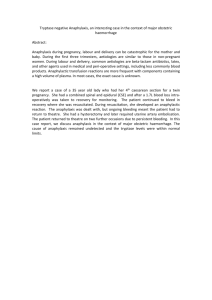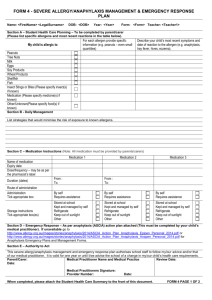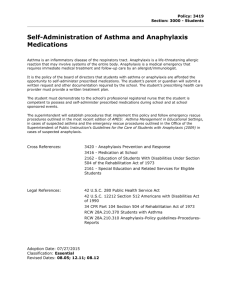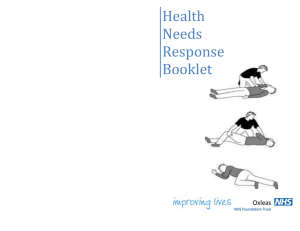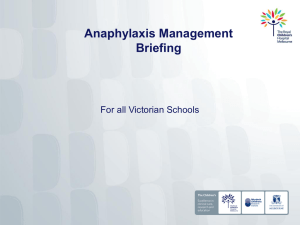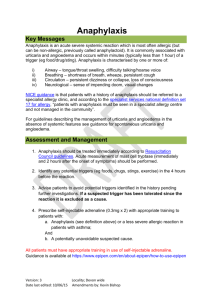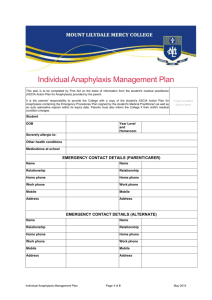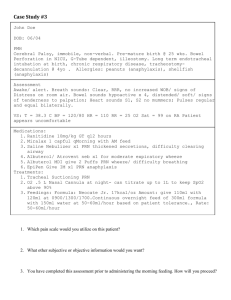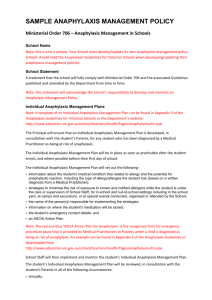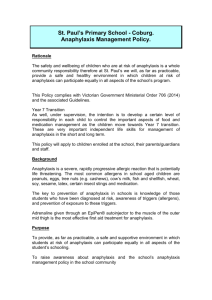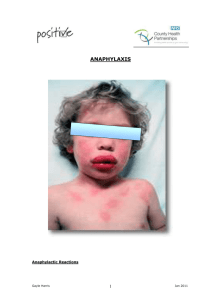Anaphylaxis Policy 2014 - Flowerdale Primary School
advertisement
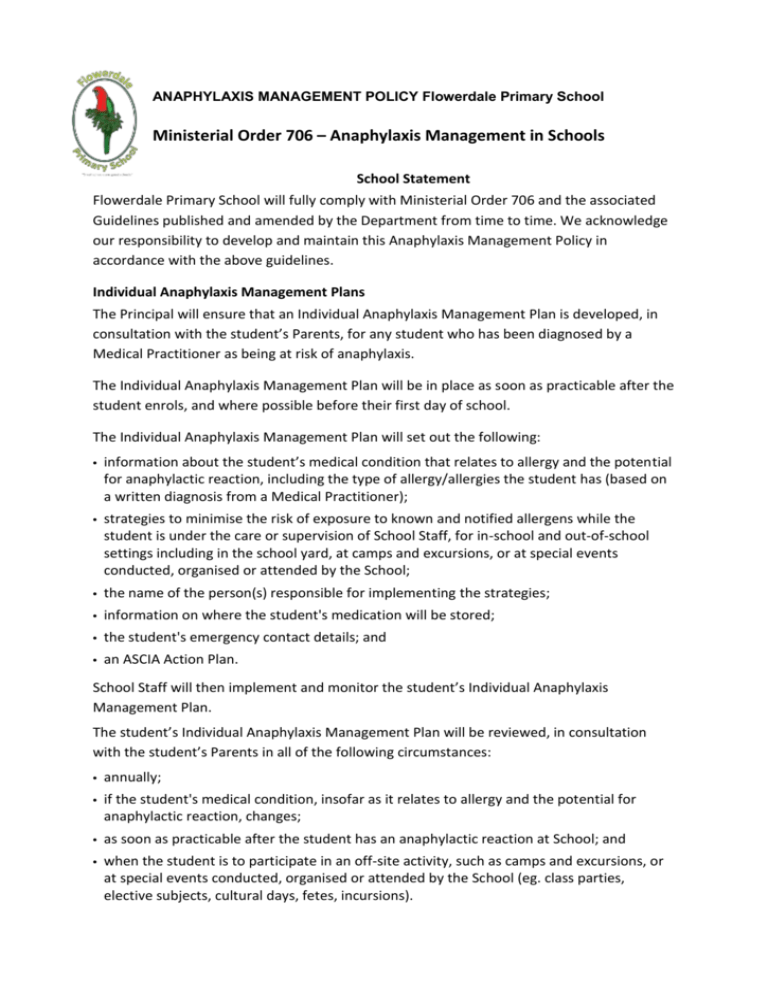
ANAPHYLAXIS MANAGEMENT POLICY Flowerdale Primary School Ministerial Order 706 – Anaphylaxis Management in Schools School Statement Flowerdale Primary School will fully comply with Ministerial Order 706 and the associated Guidelines published and amended by the Department from time to time. We acknowledge our responsibility to develop and maintain this Anaphylaxis Management Policy in accordance with the above guidelines. Individual Anaphylaxis Management Plans The Principal will ensure that an Individual Anaphylaxis Management Plan is developed, in consultation with the student’s Parents, for any student who has been diagnosed by a Medical Practitioner as being at risk of anaphylaxis. The Individual Anaphylaxis Management Plan will be in place as soon as practicable after the student enrols, and where possible before their first day of school. The Individual Anaphylaxis Management Plan will set out the following: information about the student’s medical condition that relates to allergy and the potential for anaphylactic reaction, including the type of allergy/allergies the student has (based on a written diagnosis from a Medical Practitioner); strategies to minimise the risk of exposure to known and notified allergens while the student is under the care or supervision of School Staff, for in-school and out-of-school settings including in the school yard, at camps and excursions, or at special events conducted, organised or attended by the School; the name of the person(s) responsible for implementing the strategies; information on where the student's medication will be stored; the student's emergency contact details; and an ASCIA Action Plan. School Staff will then implement and monitor the student’s Individual Anaphylaxis Management Plan. The student’s Individual Anaphylaxis Management Plan will be reviewed, in consultation with the student’s Parents in all of the following circumstances: annually; if the student's medical condition, insofar as it relates to allergy and the potential for anaphylactic reaction, changes; as soon as practicable after the student has an anaphylactic reaction at School; and when the student is to participate in an off-site activity, such as camps and excursions, or at special events conducted, organised or attended by the School (eg. class parties, elective subjects, cultural days, fetes, incursions). It is the responsibility of the parents to: provide the ASCIA Action Plan; inform the School in writing if their child’s medical condition, insofar as it relates to allergy and the potential for anaphylactic reaction, changes and if relevant, provide an updated ASCIA Action Plan; provide an up to date photo for the ASCIA Action Plan when that Plan is provided to the School and when it is reviewed; and provide the School with an Adrenaline Autoinjector that is current and not expired for their child. Prevention Strategies The school will put in place the following Risk Minimisation and Prevention Strategies: At school 1. A copy of individual Anaphylaxis Management Plans for individual student’s is located in the student’s classroom and on the board in the staffroom. The Adrenaline Autoinjectors are located with the student plans. A spare Autoinjector is located in the sickbay. 2. Liaison with parents regarding trigger foods. 3. Non-food treats are generally used in the school. 4. Nut-awareness is promoted amongst all students and parents. 5. Special school lunches do not include nuts. 6. All permanent school staff are trained in Anaphylaxis management. 7. Anaphylactic student is known by all staff members. 8. Parents are consulted with regard to student’s food allergies and food choices. On excursions and camps Risk management procedures are put in place on camps and excursions that include the following: 1. 2. 3. 4. 5. Liasion with the school camp regarding food suitable for the anaphylactic student. Normal duty of care processes to be followed by school staff. Consultation with parents and camp owners prior to school camps Avoidance of allergens and triggers such as peanuts or tree nuts. The student’s Adrenaline Autoinjector, Individual Action Plan and a mobile phone will always be taken on camps and excursions. The action plan must be updated and relevant to the circumstances of the individual camp. 6. Maintenance of appropriate staff/student ratios, adequate supervision particularly at mealtimes. 7. Sufficient school staff trained in management of anaphylaxis. School Management and Emergency Response The school will maintain: A complete and up to date list of students identified as having a medical condition that relates to allergy and the potential for anaphylactic reaction; Details of Individual Anaphylaxis Management Plans and ASCIA Action Plans. These are located in the student’s individual classroom and in the staffroom (see Appendix 1). Bus travellers will also have an Adrenaline Autoinjector in their school bag and the bus driver is aware of the medical needs of the student. On school excursions the Action Plan and Adrenaline Autoinjector will be carried by the teacher in charge and the affected student will be assigned to that teacher’s care. Accurate records regarding the expiry date, storage and accessibility of Adrenaline Autoinjectors. Regular communication with School Staff, students and Parents via the communication policy. Adrenaline Autoinjectors for General Use The Principal will purchase Adrenaline Autoinjectors for General Use and as a back up to those supplied by Parents. The Principal will determine the number of additional Adrenaline Autoinjector(s) required. In doing so, the Principal will take into account the following relevant considerations: the number of students enrolled at the School who have been diagnosed as being at risk of anaphylaxis; the accessibility of Adrenaline Autoinjectors that have been provided by Parents of students who have been diagnosed as being at risk of anaphylaxis; the availability and sufficient supply of Adrenaline Autoinjectors for General Use in specified locations at the School, including in the school yard, and at excursions, camps and special events conducted or organised by the School; and the Adrenaline Autoinjectors for General Use have a limited life, usually expiring within 1218 months, and will need to be replaced at the School’s expense, either at the time of use or expiry, whichever is first. Communication Plan Information regarding Anaphylaxis management will be communicated to all school staff, students and parents through newsletters and publication of the School's Anaphylaxis Management and Healthy Eating Policies. Staff are updated regularly on the health of the student with anaphylaxis and the student’s medical details are checked regularly and noticeboards updated as required. Staff undertake role plays and discussion regarding treatment of anaphylaxis and how to respond in an emergency. Casual Relief Teachers are informed via teacher work programs of any student including those with anaphylaxis, who may have special medical needs. They are also informed verbally by the principal prior to beginning work. These teachers will be supported by school staff to respond to an anaphylaxis incident. It is the responsibility of the Principal of the School to ensure that relevant School Staff are: trained; and briefed at least twice per calendar year. Staff Training The following School Staff will be appropriately trained: All permanent staff at Flowerdale Primary School including ES staff are fully trained in Anaphylaxis management. This training will include participation in two whole-school briefings throughout the school year on: o the School’s Anaphylaxis Management Policy; o the causes, symptoms and treatment of anaphylaxis; o the identities of the students with a medical condition that relates to an allergy and the potential for anaphylactic reaction, and where their medication is located; o how to use an Adrenaline Autoinjector, including hands on practise with a trainer Adrenaline Autoinjector device; o the School’s general first aid and emergency response procedures; and o the location of, and access to, Adrenaline Autoinjector that have been provided by Parents or purchased by the School for general use. The briefing will be conducted by a member of School Staff who has successfully completed an Anaphylaxis Management Training Course in the last 12 months. In the event that the relevant training and briefing has not occurred, the Principal will develop an interim Individual Anaphylaxis Management Plan in consultation with the Parents of any affected student with a medical condition that relates to allergy and the potential for anaphylactic reaction. Training will be provided to relevant School Staff as soon as practicable after the student enrols, and preferably before the student’s first day at School. The Principal will ensure that while the student is under the care or supervision of the School, including excursions, yard duty, camps and special event days, there is a sufficient number of School Staff present who have successfully completed an Anaphylaxis Management Training Course in the three years prior. Annual Risk Management Checklist The Principal will complete an annual Risk Management Checklist as published by the Department of Education and Early Childhood Development to monitor compliance with their obligations. See Appendix 2 –Risk Management Guide Appendix 3- Risk Management Checklist Ratified at School Council 2nd September 2014
